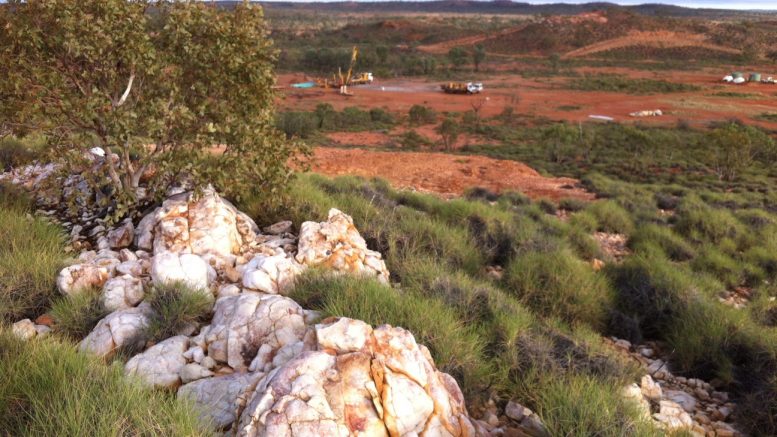VANCOUVER — Vendetta Mining (TSXV: VTT; US-OTC: VDTAF) sees a new resource update at its Pegmont lead-zinc project in northwest Queensland, Australia, as the next step towards a preliminary economic assessment (PEA) it hopes to complete within 18 months.
The company plans to drill 12,000 metres in 2017, and update the resource again before year-end. The goal is to delineate 15 million tonnes of zinc-lead mineralization for near-term mine planning and potential development.
On June 26, Vendetta reported that Pegmont hosts inferred resources of 9.6 million tonnes grading 5% lead, 2.9% zinc and 8 grams silver per tonne. Indicated resources are 2.2 million tonnes at 5.6% lead, 2.6% zinc and 10 grams silver.

Drillers working at the Pegmont lead-zinc project during the 2016 field season. Credit: Vendetta Mining.
“There hadn’t been an effort to add tonnes to the project before we took over,” Vendetta president and CEO Michael Williams says during an interview. “Our approach was to reverse engineer and figure out what we’d need in an economic mine plan.
“We figured that getting to 10 million tonnes in this estimate would be a great start. Obviously we hope to find more than that over the mine life. The (deposit) doesn’t stop where we finished our drilling.”
The updated estimate incorporates 12,700 metres Vendetta drilled between 2014 and 2016, and assumes metal prices of US90¢ per lb. lead, US95¢ per lb. zinc and US$15 per oz. silver.

Outcrop at the Pegmont lead-zinc project in Queensland, Australia. Credit: Vendetta Mining.
Vendetta describes Pegmont as hosting a body of stratiform, lead-zinc sulphides within a metamorphosed, silicate facies banded-iron formation. It is a Broken Hill-type deposit that occurs in sedimentary basins overprinted by high-grade (upper amphibolite to granulite) metamorphism.
“Historic drilling was close to surface, and didn’t cut below the amphibolite dike. This emerged as a focus … and we leveraged orientated drilling to figure things out structurally,” Williams says.
“It was thought of as a lead-dominant, single-lens orebody, and that’s why it sat idle. We looked at the data and said: ‘this looks like a Broken Hill-style model.’ This meant there would be multiple lenses and room for growth on the historic resource.”

Vendetta Mining’s Pegmont camp lies 175 km southeast of Mount Isa in Queensland, Australia. Credit: Vendetta Mining.
Vendetta has defined several open-pit and underground mining scenarios.
The project hosts open-pit, constrained inferred resources of 6.3 million tonnes at 5.4% lead and 2.4% zinc. The company is contemplating a starter pit, while Zones 1 and 2 represent near-surface targets. Zones 4 and 5 contain underground sulphide resources of 3.3 million inferred tonnes grading 4.1% lead and 3.8% zinc.
“We felt our latest drilling dialled into the geology and structures of the system,” Williams says. “We’re confident there’s going to be an open-pit component to our mine plan, and our goal is to expand this potential. We hope the early open-pit element will help the payback period on upfront capital before moving underground.”

The exploration camp at Vendetta Resources’ Pegmont lead-zinc project in northwest Queensland, Australia. Credit: Vendetta Resources.
The company started its latest exploration campaign in April, and had completed 21 holes over nearly 4,000 metres by press time.
Vendetta’s drilling will include upgrading open-pit targets to the PEA level, expanding inferred underground resources and testing regional exploration targets.
The company has also budgeted for metallurgical work at Pegmont this year, including flotation and comminution work on sulphide mineralization.
Vendetta closed a $4.2-million private placement in April, where it issued 21.2 million units at 20¢ each. The units comprise one share and half a warrant exercisable for two years at 30¢.

Drillers at Vendetta’s Pegmont lead-zinc project in Australia. Credit: Vendetta Resources.
The company’s shares have traded in a 52-week range of 6¢ to 35¢ per share, and last closed at 27.5¢. There are 107 million shares outstanding for a $29.5-million market capitalization.
“Earlier this year the phone really started to ring … investors are on the lookout for quality zinc projects,” Williams says.
“We have great infrastructure in a mining jurisdiction, and we’ll continue to see the project grow. The value will emerge as the market moves into the second stage of a zinc rally that’s a supply-side story. With a new understanding of the structural geology, we’re optimistic that Pegmont will get to 15 million tonnes.”


Be the first to comment on "Vendetta updates resource estimate on Pegmont lead-zinc project in Australia"